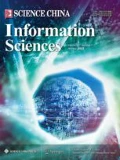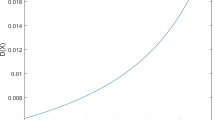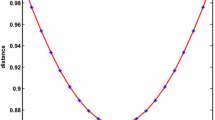Abstract
The fusion of ordered propositions is an important and widespread problem in artificial intelligence, but existing fusion methods have difficulty handling the fusion of ordered propositions. In this paper, we propose a solution based on consistency and uncertainty measurements. The main contributions of this paper are as follows. First, we propose the concept of convexity degree, mean, and center of basic support function to comprehensively describe the basic support function of ordered propositions. Second, we introduce entropy as a measure of uncertainty in the basic support function of ordered propositions. Third, we generalize the indeterminacy of the basic support function and propose a novel method to measure the consistency between two basic support functions. Finally, based on the above researches, we propose a novel algorithm for fusing ordered propositions. Theoretical analysis and experimental results demonstrate that the proposed method outperforms state-of-the-art methods.
Similar content being viewed by others
References
Dempster A P. Upper and lower probabilities induced by a multivalued mapping. Ann Math Stat, 1967, 38: 325–339
Shafer G. A Mathematical Theory of Evidence. Princeton: Princeton University Press, 1976
Wang H, Liu J, Augusto J C. Mass function derivation and combination in multivariate data spaces. Inform Sci, 2010, 180: 813–819
Murphy C K. Combining belief functions when evidence conflicts. Decis Support Syst, 2000, 29: 1–9
Han D Q, Han C Z, Deng Y, et al. Weighted combination of conflicting evidence based on evidence variance. Acta Electro Sin, 2011, 39: 153–157
Song Y F, Wang X D, Lei L, et al. Evidence combination based on the degree of credibility and falsity. J Commun, 2015, 36: 2015104
Yang Y, Han D Q, Han C Z. Evidence combination based on multi-criteria rank-level fusion. Acta Autom Sin, 2012, 38: 823–831
Florea M C, Jousselme A L, Bosse E, et al. Robust combination rules for evidence theory. Inform Fusion, 2009, 10: 183–197
Smarandache F, Dezert J. Proportional Conflict Redistribution Rules for Information Fusion, Advances and Applications of DSmT for Information Fusion (Collected works). Rehoboth: American Research Press, 2006
Fu Y W, Yang W. Combination rule based on proportional redistribution of generalized conflict for evidence theory. Chin J Electron, 2014, 23: 533–538
Liu W. Analyzing the degree of conflict among basic support functions. Artif Intell, 2006, 170: 909–924
Yang Y, Liu D Y, Wu L Z, et al. An important extension of an evidence theory based on inexact reasoning model. J Comput, 1990, 13: 772–778
Liu D Y, Ouyang J H, Tang H Y, et al. Research on a simplified evidence theory model. J Comput Res Dev, 1999, 36: 134–138
Liu D Y, Yang K, Tang H Y. A convex evidence theory model. J Comput Res Dev, 2000, 37: 175–181
Liu D Y. Numerical Methods for Uncertainty and Vagueness in Knowledge Systems. Changchun: Jilin University Press, 2000
Guan J W, Xu Y. Model expert system MES. In: Proceedings of the 9th International Joint Conference on Artificial Intelligence (IJCAI 85), Los Angeles, 1985. 397–399
Dai J H, Wang W T, Xu Q, et al. Uncertainty measurement for interval-valued decision systems based on extended conditional entropy. Knowl-Based Syst, 2012, 27: 443–450
Wang G Y, Ma X, Yu H. Monotonic uncertainty measures for attribute reduction in probabilistic rough set model. Int J Approx Reason, 2015, 59: 41–67
Shannon C E. A mathematical theory of communication. Bell Syst Tech J, 1948, 27: 379–423
Liu C, Grenier D, Jousselme A L, et al. Reducing algorithm complexity for computing an aggregate uncertainty measure. IEEE Trans Syst Man Cybernet A, 2007, 37: 669–679
Huynh V N, Yoshiteru N. Notes on reducing algorithm complexity for computing an aggregate uncertainty measure. IEEE Trans Syst Man Cybernet A, 2010, 40: 205–209
Jousselme A L, Liu C S, Grenier D, et al. Measuring ambiguity in the evidence theory. IEEE Trans Syst Man Cybernet A, 2006, 36: 890–903
Klir G J, Lewis H W. Remarks on measuring ambiguity in the evidence theory. IEEE Trans Syst Man Cybernet A, 2008, 38: 995–999
Smarandache F, Martin A, Osswald C. Contradiction measures and specificity degrees of basic belief assignments. In: Proceedings of the 14th International Conference on Information Fusion, Chicago, 2011. 1–8
Acknowledgements
This work was supported by National Natural Science Foundation of China (Grant Nos. 61133011, 61502198, 61572226, 61472161, 61373053), China Postdoctoral Science Foundation (Grant No. 2013M541303), Science and Technology Development Program of Jilin Province of China (Grant No. 20150520066-JH), and State Key Laboratory of Applied Optics. The authors would like to appreciate the handling editor and the anonymous reviewers, whose constructive and insightful comments greatly helped in improving this paper.
Author information
Authors and Affiliations
Corresponding author
Additional information
Conflict of interest The authors declare that they have no conflict of interest.
Rights and permissions
About this article
Cite this article
Liu, D., Zhu, Y., Ni, N. et al. Ordered proposition fusion based on consistency and uncertainty measurements. Sci. China Inf. Sci. 60, 082103 (2017). https://doi.org/10.1007/s11432-016-9101-8
Received:
Accepted:
Published:
DOI: https://doi.org/10.1007/s11432-016-9101-8




